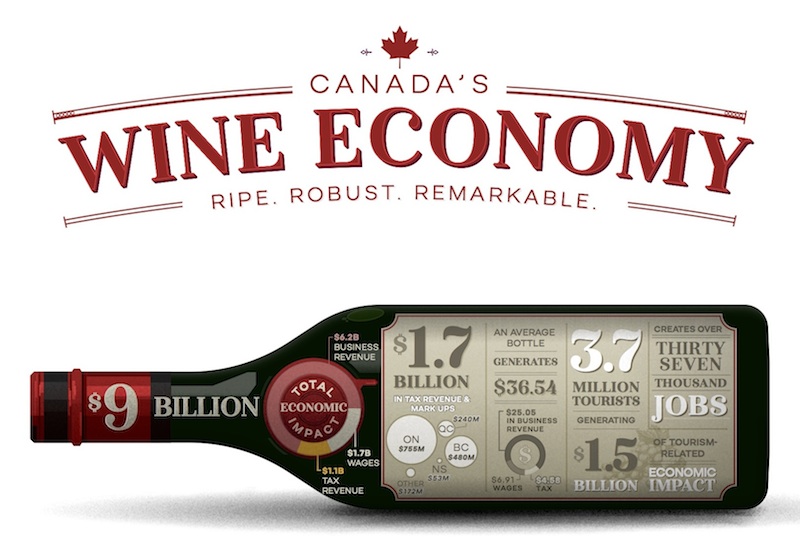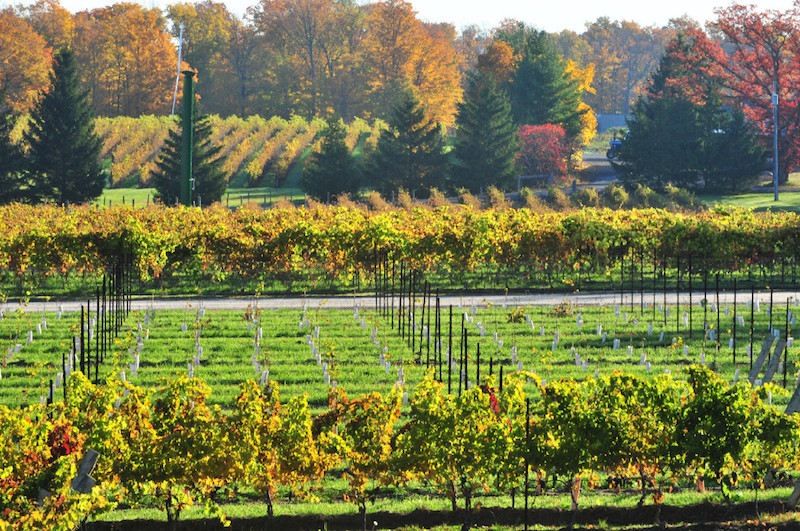
By Rick VanSickle
The numbers are staggering — the Canadian wine and grape industry contributes $9 billion in economic impact to the Canadian economy — but it is the lost potential that we should be most concerned with.
Together with the All-Party Parliamentary Canadian Wine Caucus, the Canadian Vintners Association (CVA) and its partners announced this week the results of a research study conducted on the Canadian wine and grape industry, which reveals that the economic impact of the Canadian Wine industry is up 33% from $6.8 billion to $9 billion over the period 2011-2015.
Commissioned by the Canadian Vintners Association, the Winery & Grower Alliance of Ontario, the British Columbia Wine Institute and the Winery Association of Nova Scotia, the report, called Canada’s Wine Economy – Ripe Robust Remarkable, confirms the wine industry has become a large and significant contributor to the overall Canadian economy, especially in Ontario, British Columbia, Quebec and Nova Scotia.

“The Canadian wine industry is an increasingly significant contributor to our national economy,” said CVA President and CEO Dan Paszkowski. “Our 671 wineries, largely small, family-owned businesses, create jobs, pay significant taxes, and boost regional, provincial and national economies alike,” he added.
You’d think with an impact like that provincial governments would bend over backwards to set Canadian grapes free to do their own thing without big brother monopolies and truly flourish in a free and open market.
The lost potential, more so in the brutally restrictive retail environment of Ontario rather than B.C., exists because the government still feels that consumers need a giant-sized monopoly, with its own huge bureaucracy and reckless spending (opening a bar in downtown Toronto to sell drinks without alcohol, comes to mind), to choose what and how we buy and enjoy wine.

It’s absurd that in 2017 wine lovers still have to seek out a government store to buy their wine, or, more recently, a grocery store that has to buy the wine they sell from that very same government store.
It’s absurd that in 2017 wineries have to go begging at the one place that can make or break them — the LCBO — to have their wines appear on retail shelves so the masses can have better choice. The problem is, the LCBO only buys a tiny fraction of what’s produced and if some high-paid honcho doesn’t like the cut of your jib, it’s no deal for you. As you have probably noticed, the wine you are flogging better hit the LCBO sweet spot of $13-$15, have a catchy, eye-popping label and be a large enough production that it can be sold at the network of cookie-cutter stores throughout the province.
It’s absurd that in 2017 we still do not have one, not one, private wine shop (I’m not counting the stores owned by Peller and Constellation Brands because they sell only their own products) where consumers would have greater choice and wineries would have more than one alternative (other than their own winery) to retail their products.
 The premier of Ontario, Kathleen Wynne, has taken baby steps to appease the Ontario wine industry and keep the powerful union that works as brothers- and sisters-in-arms with the LCBO somewhat pacified by slowly, emphasis on slowly, allowing grocery stores to sell wine alongside beer and cider. It has been, by all accounts, a nice little avenue for wineries and the selection and presentation at the grocery stores I’ve seen has been impressive. Problem is, for both wineries and the grocery stores, it’s just a sideline for the LCBO, which controls distribution and takes its cut regardless of where it’s sold — and there is no such thing as competitive pricing (and we all know the grocery stores can retail wine a lot cheaper and make more money for everyone involved).
The premier of Ontario, Kathleen Wynne, has taken baby steps to appease the Ontario wine industry and keep the powerful union that works as brothers- and sisters-in-arms with the LCBO somewhat pacified by slowly, emphasis on slowly, allowing grocery stores to sell wine alongside beer and cider. It has been, by all accounts, a nice little avenue for wineries and the selection and presentation at the grocery stores I’ve seen has been impressive. Problem is, for both wineries and the grocery stores, it’s just a sideline for the LCBO, which controls distribution and takes its cut regardless of where it’s sold — and there is no such thing as competitive pricing (and we all know the grocery stores can retail wine a lot cheaper and make more money for everyone involved).
Wynne is a write-off. She’s screwed up this province so badly that she’s not coming back to screw up anymore after the election. That means, here we go again, a new government, a new set of problems to deal with, and wine industry associations are left to fight the same fight they’ve fought for years.
Maybe this report showing raw data that can’t be ignored will put privatization of booze to the top of the pile of government business to tackle for the new regime.
In the report, it was noted that Canadian winemakers support a broad network of related industries in rural and regional centres across Canada through significant investments, long-term jobs and market opportunities in rural communities.
“The wine and grape industry is a Canadian success story. Not only does the sector employ over 37,000 Canadians, but the diversity of the jobs created from this industry is remarkable. Ranging from tourism and retail, to marketing, laboratory research, and farming, this sector welcomes Canadians from a range of backgrounds and talents,” said MP for Niagara Centre and Co-chair of the Parliamentary Wine Caucus, Vance Badawey. “Building on the successes to date, I look forward to working alongside all industry stakeholders as we continue to grow this exceptional industry,” he added.

Wine consumption in Canada continues to grow as many Canadians are reaching for a glass of wine over spirits or beer. With Canadian wines presently representing only 30% of total wine sales across the country and imported wine at 70%, there is enormous potential for Canadian wine sales growth, which would benefit the entire national economy.
“Every dollar invested in the Canadian wine economy stimulates more jobs, more revenue and more taxes,” says Paszkowski. “We contributed $9 billion to the national economy in 2015 or $1 million every hour, which is 33% more than in 2011.”
The independent study was conducted by Frank, Rimerman + Co., a leading international accounting and research firm in the wine industry, which has conducted similar studies for other winemaking regions around the world.
Canadian wine industry key findings:
- Canadian wine industry production has an annual national economic impact of $9 billion
- An average bottle of wine sold in Canada there is $36.54 of domestic economic impact generated in the country.
- The Ontario wine and grape industry generates $4.4 billion in economic impact, British Columbia $2.8 billion, Quebec $1.1 billion and $218 million in Nova Scotia.
- The wine and grape industry is responsible for more than 37,000 jobs in Canada from manufacturing, agriculture, tourism, transportation, research, restaurants and retail.
- Wine-related tourism welcomes more than 3.7 million visitors each year, generating more than $1.5 billion annually in tourism revenue and employment.
- The wine industry generates $1.7 billion in federal and provincial tax revenue and liquor board mark up.
- For every $1 spent on Canadian wine sold in Canada, $3.42 in Gross Domestic Product (GDP) is generated across the country.
Complete findings of the study can be found in the research report, Canada’s Wine Economy – Ripe. Robust. Remarkable.








Well written and bang on Rick. The LCBO union is strong and the constant changes in Government mean changing tactics. WE the people need also move things forwarded. Get Active